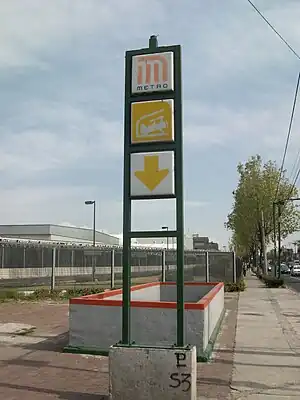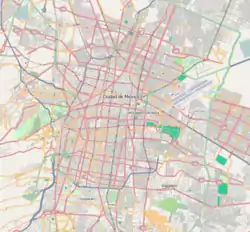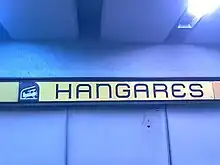Hangares metro station
Hangares metro station[lower-alpha 1] is a Mexico City Metro station in Venustiano Carranza, Mexico City. It is an underground station with two side platforms, served by Line 5 (the Yellow Line), between Terminal Aérea and Pantitlán stations. Hangares metro station serves the colonia of Federal, located next to the Mexico City International Airport. The station was opened on 19 December 1981, on the first day of the then Consulado–Pantitlán service. The pictogram for the station features a biplane inside a hangar and its name is on account of its proximity to the airport's hangars. In 2019, the station had an average daily ridership of 4,856 passengers, making it the 188th busiest station in the network and the twelfth busiest of the line.
| STC rapid transit | ||||||||||||||||||||||||||||||||||||||||||||||||||||||||||||||||||||||||||||||||||||||||||||||||||||||||||
 Station sign, 2012 | ||||||||||||||||||||||||||||||||||||||||||||||||||||||||||||||||||||||||||||||||||||||||||||||||||||||||||
| General information | ||||||||||||||||||||||||||||||||||||||||||||||||||||||||||||||||||||||||||||||||||||||||||||||||||||||||||
| Location | Fuerza Aérea Mexicana Avenue Venustiano Carranza, Mexico City Mexico | |||||||||||||||||||||||||||||||||||||||||||||||||||||||||||||||||||||||||||||||||||||||||||||||||||||||||
| Coordinates | 19°25′27″N 99°05′15″W | |||||||||||||||||||||||||||||||||||||||||||||||||||||||||||||||||||||||||||||||||||||||||||||||||||||||||
| Owned by | Government of Mexico City | |||||||||||||||||||||||||||||||||||||||||||||||||||||||||||||||||||||||||||||||||||||||||||||||||||||||||
| Operated by | Sistema de Transporte Colectivo (STC) | |||||||||||||||||||||||||||||||||||||||||||||||||||||||||||||||||||||||||||||||||||||||||||||||||||||||||
| Line(s) | ||||||||||||||||||||||||||||||||||||||||||||||||||||||||||||||||||||||||||||||||||||||||||||||||||||||||||
| Platforms | 2 side platforms | |||||||||||||||||||||||||||||||||||||||||||||||||||||||||||||||||||||||||||||||||||||||||||||||||||||||||
| Tracks | 2 | |||||||||||||||||||||||||||||||||||||||||||||||||||||||||||||||||||||||||||||||||||||||||||||||||||||||||
| Connections | ||||||||||||||||||||||||||||||||||||||||||||||||||||||||||||||||||||||||||||||||||||||||||||||||||||||||||
| Construction | ||||||||||||||||||||||||||||||||||||||||||||||||||||||||||||||||||||||||||||||||||||||||||||||||||||||||||
| Structure type | Underground | |||||||||||||||||||||||||||||||||||||||||||||||||||||||||||||||||||||||||||||||||||||||||||||||||||||||||
| Other information | ||||||||||||||||||||||||||||||||||||||||||||||||||||||||||||||||||||||||||||||||||||||||||||||||||||||||||
| Status | In service | |||||||||||||||||||||||||||||||||||||||||||||||||||||||||||||||||||||||||||||||||||||||||||||||||||||||||
| History | ||||||||||||||||||||||||||||||||||||||||||||||||||||||||||||||||||||||||||||||||||||||||||||||||||||||||||
| Opened | 19 December 1981 | |||||||||||||||||||||||||||||||||||||||||||||||||||||||||||||||||||||||||||||||||||||||||||||||||||||||||
| Key dates | ||||||||||||||||||||||||||||||||||||||||||||||||||||||||||||||||||||||||||||||||||||||||||||||||||||||||||
| 23 April 2020 | Temporarily closed | |||||||||||||||||||||||||||||||||||||||||||||||||||||||||||||||||||||||||||||||||||||||||||||||||||||||||
| 15 June 2020 | Reopened | |||||||||||||||||||||||||||||||||||||||||||||||||||||||||||||||||||||||||||||||||||||||||||||||||||||||||
| Passengers | ||||||||||||||||||||||||||||||||||||||||||||||||||||||||||||||||||||||||||||||||||||||||||||||||||||||||||
| 2022 | 1,490,365[1] | |||||||||||||||||||||||||||||||||||||||||||||||||||||||||||||||||||||||||||||||||||||||||||||||||||||||||
| Rank | 168/195[1] | |||||||||||||||||||||||||||||||||||||||||||||||||||||||||||||||||||||||||||||||||||||||||||||||||||||||||
| Services | ||||||||||||||||||||||||||||||||||||||||||||||||||||||||||||||||||||||||||||||||||||||||||||||||||||||||||
| ||||||||||||||||||||||||||||||||||||||||||||||||||||||||||||||||||||||||||||||||||||||||||||||||||||||||||
| ||||||||||||||||||||||||||||||||||||||||||||||||||||||||||||||||||||||||||||||||||||||||||||||||||||||||||
| Location | ||||||||||||||||||||||||||||||||||||||||||||||||||||||||||||||||||||||||||||||||||||||||||||||||||||||||||
 Location within Mexico City | ||||||||||||||||||||||||||||||||||||||||||||||||||||||||||||||||||||||||||||||||||||||||||||||||||||||||||
| Area map and exits | ||||||||||||||||||||||||||||||||||||||||||||||||||||||||||||||||||||||||||||||||||||||||||||||||||||||||||
Location
Hangares is a metro station located on Fuerza Aérea Mexicana Avenue, in the Venustiano Carranza borough, in eastern Mexico City, that serves the colonia (Mexican Spanish for "neighborhood") of Federal. Within the system, the station lies between Terminal Aérea and Pantitlán stations.[3] The station is located near the Mexico City International Airport.[4] The area is serviced by Route 11-C of the city's public bus system.[5]
Exits
There are two exits:[3]
- North: Fuerza Aérea Mexicana Avenue, Federal.
- South: Correos y Telégrafos Street and Asistencia Pública Street, Federal.
Landmarks
A pedestrian bridge nicknamed "MacPuente" is near the station. People use it as an improvised observation deck to see the landing and take-off of airplanes.[6][7]
History and construction

Line 5 of the Mexico City Metro was built by Cometro, a subsidiary of Empresas ICA,[8] and its first section was opened on 19 December 1981, operating from Pantitlán to Consulado metro stations.[9] Hangares is an underground station[10] whose station pictogram features a biplane inside a hangar in reference to its proximity to the airports' hangars.[3] For the Hangares–Terminal Aérea interstation tunnel, slurry walls were built using the Milan method,[8] and it is 1,153 meters (3,783 ft) long;[11][12] the Hangares–Pantitlán section goes from the underground level to the street level[13] and it is 1,644 meters (5,394 ft) long.[12]
Incidents
After the 2015 Oceanía metro station train crash, Hangares metro station was temporarily closed for repairs.[14] From 1 to 16 March 2020, Terminal Aérea, Hangares, and Pantitlán stations were closed due to a leak of gasoline in a surface petrol station.[15] From 23 April to 15 June 2020, the station was temporarily closed due to the COVID-19 pandemic in Mexico.[16][17]
Ridership
According to the data provided by the authorities since the 2000s, and before the impact of the COVID-19 pandemic on public transport, commuters averaged per year between 4,800 and 5,200 daily entrances between 2013 and 2019; the station had a ridership of 1,772,609 passengers in 2019,[18] which was a decrease of 721,611 passengers compared to 2018.[19] Also in 2019, Hangares metro station was the 188th busiest station of the system and it was the line's second-least used station.[18]
| Annual passenger ridership | |||||
|---|---|---|---|---|---|
| Year | Ridership | Average daily | Rank | % change | Ref. |
| 2022 | 1,490,365 | 4,083 | 168/195 | +57.38% | [1] |
| 2021 | 946,994 | 2,594 | 179/195 | +22.31% | [20] |
| 2020 | 777,118 | 2,123 | 191/195 | −56.32% | [21] |
| 2019 | 1,772,609 | 4,856 | 188/195 | −6.42% | [18] |
| 2018 | 1,894,220 | 5,189 | 186/195 | +2.37% | [19] |
| 2017 | 1,850,363 | 5,069 | 186/195 | +2.56% | [22] |
| 2016 | 1,804,140 | 4,929 | 186/195 | −3.91% | [23] |
| 2015 | 1,877,580 | 5,144 | 177/195 | +5.21% | [24] |
| 2014 | 1,784,681 | 4,889 | 178/195 | −4.30% | [25] |
| 2013 | 1,864,860 | 5,109 | 187/195 | −1.98% | [26] |
Notes
References
- "Afluencia de estación por línea 2022" [Station traffic per line 2022] (in Spanish). Sistema Transporte Colectivo Metro. 2023. Archived from the original on 5 March 2023. Retrieved 5 March 2023.
- Un viaje al aeropuerto / A trip to the airport. United States Department of Transportation. Federal Aviation Administration. 1979. p. 32.
- "Hangares" (in Spanish). Sistema de Transporte Colectivo Metro. Archived from the original on 4 July 2020. Retrieved 4 July 2020.
- López, Jonás (1 March 2020). "Cierran 3 estaciones de la Línea 5 del Metro por olor a gasolina" [Closed 3 stations of Metro's Line 5 due to gasoline odor]. Excélsior (in Spanish). Mexico City. Archived from the original on 6 July 2020. Retrieved 4 July 2020.
- "Red de corredores" [Route network] (in Spanish). Retrieved 30 October 2021.
- Bialostozky, Héctor (28 August 2019). "MacPuente: el puente peatonal en el Aeropuerto que se usa como mirador de aviones" [MacPuente: the pedestrian bridge in the Airport that is used as aircraft observation deck] (in Spanish). Local.mx. Archived from the original on 15 April 2020. Retrieved 15 April 2020.
- De Anda, Tamara (14 December 2017). "Excéntrica CDMX – Vuela, vuela" [Eccentric Mexico City – Fly, fly] (in Spanish). máspormás. Archived from the original on 15 December 2017. Retrieved 16 April 2020.
- "Línea 5, Ciudad de México" [Line 5, Mexico City] (in Spanish). iNGENET Infraestructura. 20 July 2009. Archived from the original on 2 September 2014. Retrieved 15 April 2020.
- "Baia, Baia, Tacubaya... Las estaciones del metro MÁS y MENOS utilizadas en CDMX" [Well, well... The MOST and LEAST used stations in Mexico City] (in Spanish). Nacion 321. 4 September 2019. Archived from the original on 15 April 2020. Retrieved 14 April 2020.
- "Hangares Metro Station (Mexico City, 1981)". Structurae.net. Archived from the original on 4 July 2020. Retrieved 4 July 2020.
- Gamez Rojas, Marlen (2010). "Análisis de riesgos de incendio en el Sistema de Transporte Colectivo Metro" [Analysis of fire risks in the Sistema de Transporte Colectivo Metro] (PDF) (in Spanish). Escuela Superior de Ingeniería Mecánica y Eléctrica. Instituto Politécnico Nacional. p. 94. Archived from the original (PDF) on 23 November 2020.
- "Longitud de estación a estación por línea" [Station-to-station length per line] (in Spanish). Sistema de Transporte Colectivo Metro. Archived from the original on 4 May 2021. Retrieved 12 July 2021.
- "Metro CDMX: ¿Cuáles son las líneas que circulan por arriba como la Línea 12, es peligroso usarlas?" [Metro CDMX: Like Line 12, which lines are elevated; is it dangerous to ride them?]. El Heraldo de México (in Spanish). 4 May 2021. Archived from the original on 13 July 2021. Retrieved 13 July 2021.
- Alarcón, Rodrigo (5 May 2015). "RTP brindará traslado gratuito de Pantitlán a Eduardo Molina" [Red de Transporte de Pasajeros will provide free service from Pantitlán to Eduardo Molina]. Excélsior. Archived from the original on 30 October 2017. Retrieved 23 August 2020.
- "Reabren estaciones de L5 del Metro cerradas por fuga de gasolina" [Reopened the Metro L5's stations closed by a gasoline leak]. Milenio (in Spanish). 17 March 2017. Archived from the original on 18 March 2020. Retrieved 15 April 2020.
- "Cierre temporal de estaciones" [Temporal closure of stations] (PDF) (in Spanish). Sistema Transporte Colectivo Metro. Archived (PDF) from the original on 4 July 2020. Retrieved 25 April 2020.
- Hernández, Eduardo (13 June 2020). "Coronavirus. Este es el plan para reabrir estaciones del Metro, Metrobús y Tren ligero" [Coronavirus. This is the plan to reopen Metro, Metrobús and Light Rail stations]. El Universal (in Spanish). Archived from the original on 4 July 2020. Retrieved 15 June 2020.
- "Afluencia de estación por línea 2019" [Station traffic per line 2019] (in Spanish). Sistema Transporte Colectivo Metro. 2020. Archived from the original on 3 July 2020. Retrieved 3 May 2020.
- "Afluencia de estación por línea 2018" [Station traffic per line 2018] (in Spanish). Sistema Transporte Colectivo Metro. 2019. Archived from the original on 6 June 2019. Retrieved 7 April 2020.
- "Afluencia de estación por línea 2021" [Station traffic per line 2021] (in Spanish). Sistema Transporte Colectivo Metro. 2022. Archived from the original on 7 March 2022. Retrieved 7 March 2022.
- "Afluencia de estación por línea 2020" [Station traffic per line 2020] (in Spanish). Sistema Transporte Colectivo Metro. 2021. Archived from the original on 21 June 2021. Retrieved 21 June 2021.
- "Afluencia de estación por línea 2017" [Station traffic per line 2017] (in Spanish). Sistema Transporte Colectivo Metro. 2019. Archived from the original on 3 May 2020. Retrieved 3 May 2020.
- "Afluencia de estación por línea 2016" [Station traffic per line 2016] (in Spanish). Sistema Transporte Colectivo Metro. 2017. Archived from the original on 3 May 2020. Retrieved 3 May 2020.
- "Afluencia de estación por línea 2015" [Station traffic per line 2015] (in Spanish). Sistema Transporte Colectivo Metro. 2016. Archived from the original on 3 May 2020. Retrieved 6 May 2020.
- "Afluencia de estación por línea 2014" [Station traffic per line 2014] (in Spanish). Sistema Transporte Colectivo Metro. 2015. Archived from the original on 3 May 2020. Retrieved 6 May 2020.
- "Afluencia de estación por línea 2013" [Station traffic per line 2013] (in Spanish). Sistema Transporte Colectivo Metro. 2014. Archived from the original on 3 May 2020. Retrieved 6 May 2020.
External links
 Media related to Hangares (station) at Wikimedia Commons
Media related to Hangares (station) at Wikimedia Commons- "Metro Hangares". At the Official Guide to Mexico City.